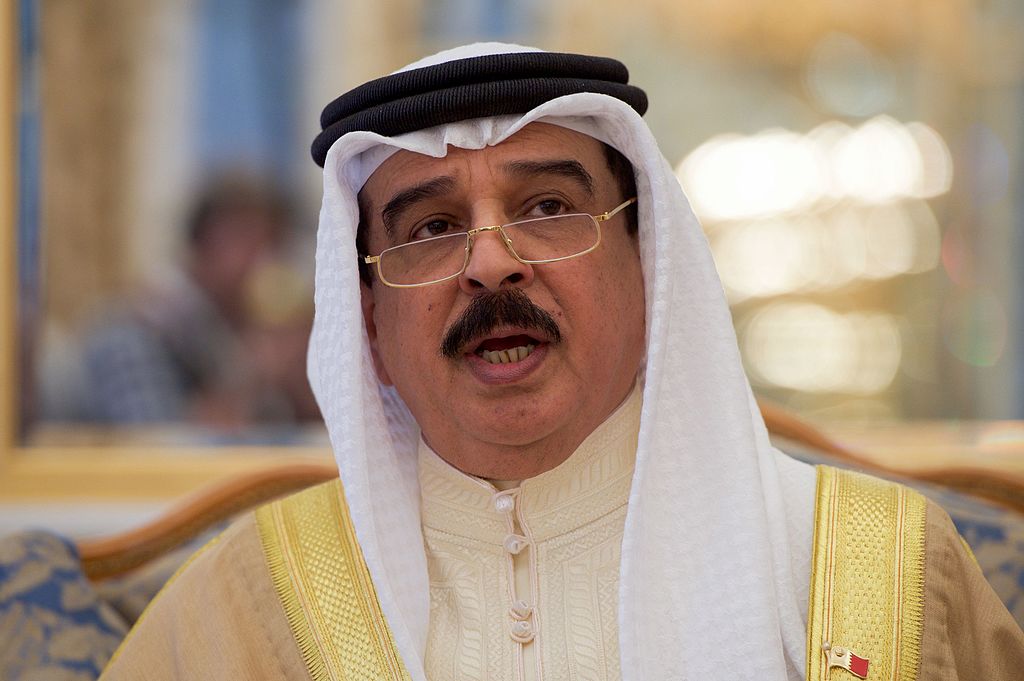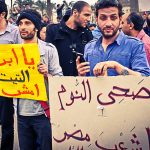by Emile Nakhleh
The New York Times reported last Thursday that the US State Department has decided to lift human rights as a condition for the sale of F-16 fighter jets and other weapons to Bahrain, a small, Sunni, family-ruled kingdom in the Persian Gulf. Ostensibly, the justification that Secretary of State Rex Tillerson gave for his decision was that Bahrain is a key ally in the fight against Iran-supported Houthis in Yemen. The US Navy Fifth Fleet is also home-ported in Bahrain.
This policy, however, clearly shows the growing influence of Bahrain’s lobbyists in Washington and the cozy relationships that Tillerson, the former head of global giant Exxon, as well as Secretary of Defense James Mattis and some current and retired military officers and diplomats, have forged with Bahrain, the United Arab Emirates, and other member countries of the Gulf Cooperation Council. These Sunni countries, the largest of which is Saudi Arabia, are ruled by tribal potentates who violate their citizens’ basic human rights blatantly, viciously, and systematically.
In addition to Bahrain, the Trump White House and the Tillerson State Department are planning to jettison the human-rights requirement as a condition for arms sales to other Middle Eastern autocratic regimes, including Egypt and the United Arab Emirates. These countries, especially the UAE, have been feverishly lobbying Washington’s power elites and opinion makers, including think tanks and high-powered consultants, to remove the human-rights requirement and focus instead on Iran and terrorism. Trump plans to convey this “good” news to Egypt’s autocrat Abdel Fattah al-Sisi on the latter’s visit to Washington. The same message would be relayed to Jordan’s King Abdullah when he comes calling.
To the dismay of human rights organizations and many foreign-policy experts who believe that a rational, effective foreign policy should be to balance American national interest and democratic values, a disquieting pattern is emerging in Trump’s management of relations with other nations.
Promoting a narrow definition of the national interest at the expense of human rights is shortsighted and, in the long run, a losing proposition. Washington often coddled dictators before the Arab Spring because American policymakers believed in those dictators’ narrative that all was well and everything was under control. They told American leaders not to worry about their peoples’ frustrations and anger.
A History of Coddling
For years, the United States was addicted to autocracy because Arab and other autocrats did Washington’s bidding without being constrained by the messiness of democracy or parliamentary debates. In March 2003, for example, the United States became frustrated with Turkey’s parliament for not allowing American fighter jets to cross Turkish airspace on their way to Iraq. A person at the National Security Council told me at the time that if Turkey were ruled by a dictator, like many of its neighbors, “we would not have had to deal with a parliamentary vote.”
The Arab Spring uprisings proved the fallacy of the autocratic narrative. Regardless of the instability, chaos, and bloodshed that followed the 2011 popular uprisings, well-entrenched autocrats were swept out of office. Egypt’s Hosni Mubarak, Yemen’s Ali Abdullah Saleh, Libya’s Muammar Qaddafi, and Tunisia’s Zine El Abidine Ben Ali are now no more than footnotes in the sordid and sad history of the Arab world. Unfortunately for Arab publics, the deep security state survived the fall of the leader at the top.
Syria’s dictator Bashar al-Assad continues to cling to power, thanks to the support of his Russian and Iranian benefactors. U.S. involvement in destroying Syria and killing the population, which ultimately serve the regional interests of Russia and Iran, has already undermined America’s role as a key regional player.
Sadly, the Trump administration is becoming more tolerant of Assad, foolishly arguing that fighting the Islamic State (ISIS or iS) is more critical than removing the Syrian leader, as if the two were disconnected. President Trump seems comfortable in dealing with Sunni Arab autocrats, which of course alienates their publics and reinforces the radical narrative that America is against Arabs and Muslims. The recent travel ban against some Arab Muslim countries plays into this narrative as well.
By ignoring the human-rights requirement, the Trump White House is signaling its tacit approval of Arab autocrats’ bloody crackdown on their citizens. Tens of thousands of Egyptians, Bahrainis, and Saudis are languishing in jail as a result of illegal arrests and sham trials. Many others have been executed, tortured, and “disappeared.”
The Trump administration justifies the new policy because these countries are “close allies” of the United States and are important partners in the fight against terrorism, especially IS. Yet, despite the billions of dollars in arms sales to Egypt, Bahrain, Saudi Arabia, and the UAE, the threat of terrorism has not receded. The destructive and illegal war that Saudi Arabia and the UAE are waging in Yemen has failed to defeat the Houthis or to contain Iran’s growing influence. Furthermore, there is no evidence that these four countries are actively involved in the fight against IS either in Iraq or in Syria.
Because of Egypt’s poor human rights record, its large defense expenditures, including the billions it receives from the United States, have not helped defeat the radical insurgency in the Sinai Peninsula. In fact, the terrorist threat to the Sisi regime is getting closer to home and becoming more ominous.
Bahrain and Human Rights
The Al-Khalifa minority ruling regime in Bahrain has participated in the extrajudicial killing of Bahraini citizens from the Shia majority and used illegal arrests and a pliant judiciary to jail peaceful dissidents. The regime’s security forces have frequently invoked the so-called anti-terror laws to dissolve law-abiding political groups, such as al-Wefaq and al-Waad, arrest their leaders, and muzzle the few remaining semi-independent media outlets such as al-Wasat newspaper.
The regime has employed the security tentacles of the Bahraini “deep state” to destroy all opposition to the regime. The Al-Khalifa autocrats have spent a lot of money through lobbying, compliant media, “friendly” think tanks, well-funded consultants—many of whom are retired diplomats, military officers, corporate executives, and sympathetic members of Congress and the executive branch—to peddle a pro-regime narrative. The Bahraini regime has no shortage of “experts” and Washington insiders willing to sing its praises. Although a tiny monarchy, Bahrain has highlighted its central role in serving American interests in the region. As payback, the regime has lobbied the Trump administration to support its domestic policies of repression.
According to a recent Washington Post article, the Bahraini government claimed that it seized a secret bomb factory in a Bahraini home containing lathes and hydraulic presses to make tank-piercing explosively-formed projectiles or EFPs. By claiming that Iran supplied the weapons-making equipment, Bahraini security officials are making every effort to convince Western governments that Tehran is behind the anti-regime protest movement. The regime has conveyed this supposedly “breaking news” discovery to Washington through such friendly think tanks as the Washington Institute for Near East Policy.
The regime has previously made similar assertions to discredit the opposition and to paint it with a broad brush of terrorism. The recent find, however, is arguably more ominous than previous ones. Second, although in recent years certain elements of the opposition movement have become more militant and have turned toward violence and terrorism—the Iranian supported al-Ashtar Brigades is one example of such Shia militancy—the bulk of the opposition remains peaceful.
Third, despite the regime’s claims to the contrary, violent Shia groups in Bahrain do not represent the large majority of anti-regime dissidents, whether individuals or groups. The regime’s efforts to link peaceful opposition with terrorists are disingenuous, and it would be sad for Western countries to fall for this dubious claim. Fourth, the regime’s draconian response to peaceful protests in the past six years has fueled the rise of militancy within the Shia majority. It was a calculated policy designed to produce the self-fulfilling prophecy that the opposition consists of terrorists. In this regard, the Al-Khalifa regime has followed a pattern established by other autocrats in Egypt, Saudi Arabia, Syria, and elsewhere.
Not Serving U.S. Interests
Arab regimes that pretend to serve the interests of the United States are in fact pursuing their own interests first and foremost. Egypt has used its peace agreement with Israel as a bargaining chip to get more military aid from Washington. It has also threatened to make it more difficult for American military vessels to go through the Suez Canal and for American military aircraft to fly in Egyptian airspace if the United States halts its aid or military sales to the Sisi regime.
The reality is that Egypt benefits—economically, politically, and militarily—from its peace treaty with Israel. Nor can the Sisi regime afford to go to war with Israel. Despite nearly 40 years of peaceful relations with Israel, Egypt has failed to convince other Arab states to make peace with Israel or to minimize the terrorist threat in the region. As the treaty primarily serves Egypt’s interests, the United States should no longer pay for it. If Egypt abrogates the treaty or closes the Suez Canal or its airspace to American ships or aircraft, it will do so at its own peril.
Saudi Arabia frequently asserts that it supports American anti-terrorism policies in the region. And yet the radical ideology that underpins al-Qaeda and IS comes primarily from Saudi Arabia. Washington has been too timid to challenge the Saudis on this issue. If the Trump travel ban were designed to keep terrorists and radicalization out of the United States, why was Saudi Arabia excluded from the list of countries under the ban? And why were the Saudi ruling cousins given such a royal treatment on their recent visit to Washington?
Bahrain has used the presence of the US Navy’s Fifth Fleet in that country as a sign of the regime’s support for American policy. But Bahrain, not the United States, is the main beneficiary of the US Navy’s home-porting agreement. The United States should seriously consider moving the Fifth Fleet to another location inside or outside the Persian Gulf. Wherever it’s relocated, the Fleet will continue to ensure the free navigation through the Strait of Hormuz and the unhindered flow of oil to the outside world. By removing it from Bahrain, Washington would send a clear message to the Al-Khalifa regime that it does not tolerate its continued oppression of the Shia majority.
The Trump administration should learn from previous administrations that a military approach to foreign policy at the expense of diplomatic engagement grounded in American values does not work in the long run. The recent history of the region has taught us that coddling dictators and alienating their populations do not serve American interests. On the contrary, such an approach usually creates more unrest and, ultimately, more terrorists, which of course puts American interests and personnel at risk in those countries.
Photo: King Hamad bin Isa Al Khalifa of Bahrain






Syrian oil has nothing to do with removing Assad
Iran should reclaim Bahrain at the UN asap! Bahrain used to belong to Iran and the Shah of Iran betrayed the country by colluding with the Brits over the ownership of the 3 islands in the Persian Gulf, which they belonged to Iran anyways, and in return giving up Bahrain! ME has suffered and still suffering from the deliberate and outrageous actions of the Brits in that region for the past 100 years!
US under Trump is all about the mighty dollar. Any worsd about human rights is just a ploy and no one believes the US any longer. The US is now a naked imperialist with no consideration for the basic rights of the people.